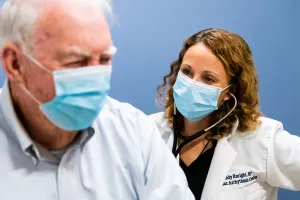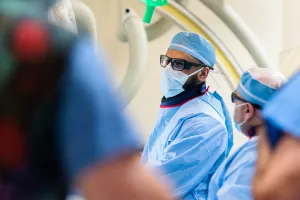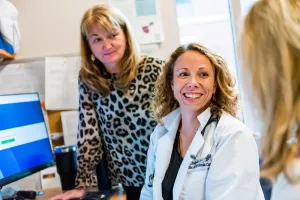Arrhythmia affects how your heart beats — too fast, too slow or in an irregular rhythm. Our electrophysiology specialists use advanced technology to diagnose and treat arrhythmia, helping you get back to a healthy heart.
Electrophysiology for heart arrhythmias: Ablation, pacemakers + ICD treatments for heart health
Your heart is powered by electricity. It creates its own electrical signals that tell your heart when to pump blood, which is what makes your heartbeat. But sometimes, these signals can get mixed up, causing an irregular heartbeat known as cardiac arrhythmia. While arrhythmia isn’t always serious, it can affect your heart and overall health.
Our electrophysiologists use their expertise in the heart’s electrical system to treat arrhythmias. With advanced methods like radiofrequency ablation and cryoablation, we’ll help you understand the cause of your condition and offer heart-healthy advice to keep your heart in rhythm.

Conditions
We treat a wide range of conditions that lead to irregular heartbeats, working to bring your heart back to a steady, healthy rhythm, including:
We'll also consider other causes of your irregular heartbeat, such as:
- Caffeine
- Excessive alcohol consumption
- Nicotine
- Side effects from medications
Once we understand the source of your arrhythmia, we can create a treatment path that addresses it as quickly and effectively as possible.
Testing
Arrhythmia is usually diagnosed by a cardiologist. To find the cause of your condition, we use a range of cardiovascular imaging and noninvasive tools to assess your heart health, including:
- Electrocardiogram (ECG): This test records your heart’s electrical activity and helps identify abnormal rhythms.
- Echocardiogram (EKG): A special ultrasound used to capture images of your heart and assess its function.
- Holter monitor: A portable, wearable ECG that tracks your heart’s electrical activity over 24 hours.
- Stress “exercise” echocardiogram: We monitor how your heart responds to exercise to better understand its behavior under stress.
Treatments
There are several ways to treat arrhythmia, ranging from minimally invasive cardiac surgery to implanting devices with interventional cardiology to help your heart maintain a healthy rhythm. Our team of experienced specialists uses advanced techniques to provide personalized care, including:
- Ablation for supraventricular tachycardia: This procedure treats fast heart rhythms caused by abnormal signals in the heart’s upper chambers. It typically takes 3–4 hours, and most people return to normal activities in a couple of days. Intense exercise should be avoided for 1–2 weeks during recovery.
- Cardiac ablation for atrial fibrillation: This treatment fixes atrial fibrillation (AFib) by creating tiny scars in the heart to block abnormal signals and restore a normal rhythm. Freezing (cryo) or heat (radiofrequency) energy is used. The procedure takes 3–4 hours, with most people returning to normal activities in 3–7 days. Strenuous activities should be avoided for 1–2 weeks after.
- Implantable cardioverter-defibrillator (ICD): This device helps prevent life-threatening heart rhythms, continuously monitoring and correcting dangerous rhythms to prevent cardiac arrest. Recovery time is typically 2–4 weeks, during which time you should avoid heavy lifting and intense exercise.
- Implantable loop recorder: This device monitors occasional irregular heartbeats for up to 3 years. It helps us understand your condition for better future care but does not treat arrhythmia. Recovery is quick, with most people resuming normal activities within a few days.
- Maze procedure: This minimally invasive treatment creates several tiny ablations to correct arrhythmias if other treatments haven’t worked. The procedure usually takes 3–4 hours, with most people returning to normal activities in 1–2 weeks. Some may need more time depending on their overall health.
Lifesaving cardiac care a heartbeat away
Locations

From regular office visits to inpatient stays, find the healthcare you need and deserve close to home.

Meet the doctors and care team devoted to supporting you every step of the way along your path to better health.